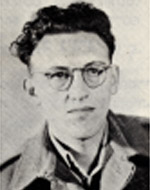Gideon, the son of Ella and Lajos (Ludwig), was born on August 12, 1927, in Vienna, capital of Austria. He attended elementary school and high school. Vienna was the center of Jewish education and literature in which the Zionist movement was concentrated. Jews played important roles in local and world culture, including famous writers, musicians and scientists such as Ze’ev Theodor Herzl, Sigmund Freud and Stefan Zweig. In the mid-1930s, some 170,000 Jews lived in the city. Modern anti-Semitism gained a broad hold among the inhabitants of Vienna. The Viennese welcomed the annexation of Austria to Germany in March 1938, and the persecution of Jews in the city was extremely cruel. Already in May 1938, 2,000 Jewish intellectuals were arrested and deported to the Dachau camp. Since then, the nightly assaults and deportations were routine. The economic situation of Vienna’s Jews worsened, and some 43,000 of them became welfare recipients. The institutions of the Jewish community dealt with the provision of social assistance, and exploited every respite between the disturbances and the deportations to the immigration effort and to the organization of life. The Community Council opened courses for vocational training and retraining, in which about 45,000 students studied. With the Nazi takeover of Vienna, Gideon’s studies in the Gymnasium were discontinued. At the time when he was still to leave, his family left Austria and with the flow of immigrants arrived in Hungary, where Gideon continued his studies. Life in Hungary was not easy either. Hungary became a protectorate of Germany, and as such adopted racial laws and imposed restrictions on the Jews in its territory. Already in 1938, a series of anti-Jewish laws were enacted in Hungary similar to the Nuremberg Laws. From the summer of 1939, Jewish men were taken to the Munkaszolgalat (Labor Service) of the Hungarian army, many of whom perished. With the Nazi takeover of Hungary in 1944, the situation of the Jews deteriorated and restrictions and restrictions were imposed on them. As part of the “Final Solution” program, which received practical aspects in April 1944, the Jews of Hungary were transferred to ghettos, and in May deportations to the Auschwitz death camp began. In 1943 Gideon was taken from his family and spent eight months in a mountain unit of the German army. When he became Jewish, he was expelled from the officers’ school and returned to Hungary. Soon Gideon and his family were among the deportees to the death camp. His parents and sister perished there, and he himself was transferred to the Buchenwald concentration camp near the city of Weimar – one of the largest concentration camps in Germany. It was difficult days and terrible torture, but Gideon survived and was privileged to see the liberation of the Allied forces when the liberation came. Gideon returned to Vienna and studied at the university for two semesters at the Faculty of Chemistry. In 1946 he was certified as an optician, and for two years worked in his profession. Immediately following the UN resolution on the partition of Palestine, Gideon began his journey to Eretz Israel, where he completed all stages of Aliyah Bet, arrived in Palestine at the beginning of 1948. He was one of the few who managed to escape from the deportation and at the end of 1948 Shortly after his arrival in January 1949, he joined the IDF. He served in the 62nd Battalion of the 6th Brigade, the Etzioni Brigade (the “Jerusalem” Brigade). His commanders recognized his high abilities, and he was transferred to the Intelligence Corps and assigned to a mapping unit. Gideon wanted to learn and progress, and after being accepted to the Hebrew University in Jerusalem, he asked to be released from the army. His request was approved and he moved to Jerusalem and studied for a year in mathematics and physics. At the end of December 1950 he decided to return to the army and sign for permanent service, so that he could finance his academic studies. Gideon lived in Ramat Gan and began his service. Thanks to his high credentials and military experience, he was sent to the officers’ course at the end of 1951. As part of the officers’ training course, the unit was trained in sailingIn Givat Olga. On January 2, 1952, during training, a grenade exploded in the ammunition depot at the range. Gideon was mortally wounded by shrapnel, and before he was rushed to the hospital, he was able to convey to his department paraphrases: “Tell the guys, ask them, hold on and adopt and continue to carry out the mission.” After two days of severe agony, on January 4, 1952, Gideon died of his wounds, twenty-four years after his death, and was brought to eternal rest in the military cemetery in Haifa. The tools and the unobtrusive … What surprised me to see how weak an external body is strong character and inner spirit. What was brave and restrained was his behavior in the face of his terrible father … “The space is” a last bastion. “The last survivor of the Holocaust is a survivor of the last of their nuclear family (parents, brothers, sisters, sons and daughters) who experienced the Holocaust And / or in concentration and extermination camps and / or in hiding and hiding in territories occupied by the Nazis and / or fighting alongside members of the underground movements or partisans in the Nazi-occupied territories who immigrated to Israel during or after World War II,
